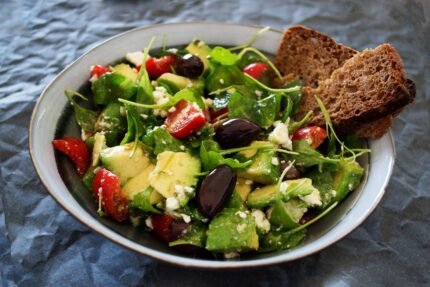Medically reviewed by Dr. Ramesh Gaddam, M.D. — Written by Sumalatha, D.N.H.E
The Mediterranean diet has its roots in the traditional dietary patterns of countries bordering the Mediterranean Sea, such as Greece, Italy, and Spain. These regions have long been celebrated for their culinary traditions, which are shaped by the local climate, geography, and cultural practices.
Historically, the Mediterranean diet evolved from the need to make the most of the available resources, resulting in a cuisine rich in fresh, seasonal produce, and simple yet flavorful ingredients.
1. Core Principles

The Mediterranean diet is characterized by its emphasis on whole, minimally processed foods.
Here are the core principles that define this way of eating:
Fruits and Vegetables:
- At the heart of the Mediterranean diet are abundant servings of fruits and vegetables.
- These are enjoyed in a variety of forms, from fresh salads to cooked dishes, providing essential vitamins, minerals, and antioxidants.
Whole Grains:
- Whole grains like barley, farro, and whole wheat are staples.
- These grains are often used in bread, pasta, and other dishes, offering a rich source of fiber and nutrients.
Healthy Fats:
- Olive oil is the primary source of fat in the Mediterranean diet.
- This healthy fat is used liberally in cooking and dressings, contributing to heart health and providing a distinctive flavor. Nuts and seeds also add healthy fats and protein to the diet.
Protein Sources:
- The Mediterranean diet includes moderate amounts of fish and seafood, which are rich in omega-3 fatty acids.
- Poultry and dairy are consumed in smaller quantities, while red meat is limited. Legumes, such as beans and lentils, provide plant-based protein and are a dietary mainstay.
Herbs and Spices:
- Instead of relying on salt, the Mediterranean diet makes extensive use of herbs and spices to enhance flavor.
- Basil, oregano, rosemary, and garlic are just a few examples of the seasonings that are used to make meals both tasty and nutritious.
Moderation and Balance:
- Sweets and red meat are enjoyed occasionally rather than daily.
- Meals are balanced and portion sizes are moderate, promoting a sustainable and healthful approach to eating.
These principles reflect a diet that is not only healthful but also deeply enjoyable, emphasizing taste, variety, and satisfaction.
By focusing on whole foods and natural flavors, the Mediterranean diet offers a model of eating that can lead to lasting health benefits and a higher quality of life.
2. Health Benefits of the Mediterranean Diet

Cardiovascular Health
One of the most well-documented benefits of the Mediterranean diet is its positive impact on heart health. Numerous studies have shown that this diet can significantly reduce the risk of heart disease.
The high intake of fruits, vegetables, whole grains, and healthy fats like olive oil helps lower LDL (bad) cholesterol levels and raise HDL (good) cholesterol levels.
Additionally, the omega-3 fatty acids found in fish are known to reduce inflammation and improve overall cardiovascular function, contributing to a lower incidence of heart attacks and strokes.
Weight Management
The Mediterranean diet promotes weight loss and maintenance in a sustainable way. Unlike restrictive fad diets, it emphasizes balanced eating and portion control.
The high fiber content from fruits, vegetables, and whole grains helps keep you full longer, reducing the likelihood of overeating.
Furthermore, the diet’s focus on healthy fats and lean proteins supports metabolic health and aids in maintaining a healthy weight without feeling deprived.
Diabetes Prevention and Management
Adopting the Mediterranean diet can also play a crucial role in preventing and managing Type 2 diabetes.
The diet’s emphasis on whole foods with a low glycemic index helps stabilize blood sugar levels.
Foods rich in fiber, such as legumes, vegetables, and whole grains, slow the absorption of sugar into the bloodstream, preventing spikes in blood glucose levels.
Research has shown that individuals following the Mediterranean diet have a significantly lower risk of developing Type 2 diabetes and better control of blood sugar levels if they already have the condition.
Longevity and Quality of Life
One of the most appealing aspects of the Mediterranean diet is its association with increased longevity and a higher quality of life.
People living in Mediterranean regions, such as the inhabitants of the Greek island of Ikaria, are known for their remarkable longevity.
The diet’s rich array of antioxidants, anti-inflammatory compounds, and essential nutrients supports overall health and reduces the risk of chronic diseases.
Additionally, the diet’s social and communal aspects, such as sharing meals with family and friends, contribute to emotional well-being and stress reduction, further enhancing quality of life.
3. Key Components of the Mediterranean Diet

Foods to Eat
The Mediterranean diet centers around fresh, whole foods that are rich in nutrients and flavors. Here are some of the key foods to include:
| Component | Description |
|---|---|
| Fruits and Vegetables | Aim to fill half your plate with a variety of colorful fruits and vegetables at each meal. Examples include tomatoes, cucumbers, bell peppers, spinach, oranges, and grapes. These provide essential vitamins, minerals, and antioxidants. |
| Whole Grains | Replace refined grains with whole grains like barley, quinoa, bulgur, and whole wheat. These grains are packed with fiber and nutrients that support digestion and long-lasting energy. |
| Healthy Fats | Olive oil is a staple of the Mediterranean diet. Use it for cooking, salad dressings, and dipping bread. Nuts and seeds, such as almonds, walnuts, and chia seeds, are also excellent sources of healthy fats and protein. |
| Fish and Seafood | Consume fish like salmon, sardines, and mackerel at least twice a week. These are rich in omega-3 fatty acids, which promote heart and brain health. |
| Legumes | Beans, lentils, and chickpeas are key protein sources and can be used in soups, stews, salads, and side dishes. They are high in fiber and essential nutrients. |
| Dairy | Choose low-fat or fat-free dairy products like Greek yogurt and cheese in moderation. These provide calcium and protein without excessive saturated fat. |
| Herbs and Spices | Flavor your dishes with herbs and spices such as basil, oregano, rosemary, thyme, and garlic. These not only enhance taste but also add health-promoting compounds. |
Foods to Limit
While the Mediterranean diet is flexible, it emphasizes moderation with certain foods:
- Red Meat: Limit red meat to a few times a month. When consumed, choose lean cuts and small portions.
- Sweets and Sugary Beverages: Enjoy sweets and desserts occasionally. Opt for natural sweeteners like honey or fruit, and avoid sugary sodas and heavily processed snacks.
- Processed Foods: Minimize consumption of highly processed foods, which are often high in unhealthy fats, sugars, and sodium. Focus instead on fresh, whole foods.
Eating Habits
The Mediterranean diet isn’t just about what you eat; it’s also about how you eat:
- Regular Physical Activity: Incorporate physical activity into your daily routine. This can include walking, cycling, swimming, or any other enjoyable activity that keeps you moving.
- Social and Communal Aspects: Sharing meals with family and friends is a key component of the Mediterranean lifestyle. It promotes mindful eating, reduces stress, and enhances the overall dining experience.
- Mindful Eating Practices: Take time to savor your meals, eat slowly, and pay attention to your hunger and fullness cues. This helps prevent overeating and encourages a more enjoyable eating experience.
By embracing these key components, you can adopt the Mediterranean diet in a way that is both nutritious and satisfying. This diet is not just a temporary change but a sustainable lifestyle that promotes long-term health and well-being.
4. How to Start the Mediterranean Diet

Practical Tips for Transitioning
Transitioning to the Mediterranean diet can be a smooth and enjoyable process with a few practical steps:
Start Small:
Begin by making small changes to your current diet. Replace processed snacks with fruits or nuts, and swap out refined grains for whole grains.
Incorporate More Vegetables:
Gradually increase your vegetable intake by adding an extra serving to each meal. Try new recipes that highlight vegetables as the main component.
Choose Healthy Fats:
Use olive oil instead of butter or margarine. Add avocados and nuts to salads and dishes for a boost of healthy fats.
Plan Your Meals:
Create a weekly meal plan that includes Mediterranean-inspired recipes. This can help you stay on track and ensure you have the necessary ingredients on hand.
Shop Smart:
Make a shopping list focused on fresh, whole foods. Visit farmers’ markets or the fresh produce section of your grocery store to stock up on fruits, vegetables, and whole grains.
5. Meal Planning and Recipes

To help you get started, here is a sample meal plan for a week, along with some easy and delicious recipes:
Sample Meal Plan:
Monday:
- Breakfast: Greek yogurt with honey, walnuts, and fresh berries.
- Lunch: Quinoa salad with chickpeas, cucumbers, tomatoes, and feta cheese.
- Dinner: Grilled salmon with a side of roasted vegetables and a whole grain roll.
Tuesday:
- Breakfast: Whole grain toast with avocado and a poached egg.
- Lunch: Lentil soup with a side salad.
- Dinner: Chicken stir-fry with bell peppers, broccoli, and brown rice.
Wednesday:
- Breakfast: Oatmeal topped with chopped nuts and dried fruit.
- Lunch: Mediterranean vegetable wrap with hummus, spinach, and roasted red peppers.
- Dinner: Baked cod with a tomato and olive tapenade, served with quinoa.
Recipes:
Quinoa Salad
- Ingredients: 1 cup quinoa, 1 can chickpeas, 1 cucumber (diced), 2 tomatoes (diced), 1/2 cup feta cheese (crumbled), 1/4 cup olive oil, juice of 1 lemon, salt, and pepper to taste.
- Instructions: Cook quinoa according to package instructions. In a large bowl, combine cooked quinoa, chickpeas, cucumber, tomatoes, and feta. Drizzle with olive oil and lemon juice, then season with salt and pepper. Toss to combine.
Grilled Salmon
- Ingredients: 4 salmon fillets, 2 tbsp olive oil, 1 lemon (sliced), fresh herbs (such as dill or parsley), salt, and pepper to taste.
- Instructions: Preheat the grill to medium-high heat. Brush salmon fillets with olive oil and season with salt and pepper. Grill salmon for 4-5 minutes on each side, or until cooked through. Serve with lemon slices and fresh herbs.
6. Overcoming Common Challenges

Starting a new diet can come with challenges, but here are some tips to overcome them:
Cost:
The perception that healthy foods are expensive can be a barrier. Focus on buying seasonal produce, which is often cheaper and fresher. Purchase grains and legumes in bulk to save money.
Accessibility:
If fresh produce is not readily available, consider frozen fruits and vegetables, which are just as nutritious. Look for local farmers’ markets or co-ops for affordable, fresh options.
Time Constraints:
Meal prepping can save time during the week. Prepare large batches of grains, chop vegetables in advance, and plan simple, quick recipes for busy nights.
Personal Preferences:
Adapt the diet to fit your tastes. If you don’t like a particular food, find a suitable alternative. The Mediterranean diet is flexible and can accommodate various preferences.
By taking these steps, you can ease into the Mediterranean diet and start enjoying its numerous health benefits. Remember, the goal is to make sustainable changes that fit your lifestyle and preferences, leading to long-term health and well-being.
7. Real-Life Success Stories
Testimonials
Hearing from individuals who have successfully adopted the Mediterranean diet can be incredibly inspiring and motivating. Here are a few real-life success stories that highlight the transformative impact of this way of eating:
Maria’s Journey to Heart Health
Background:
Maria, a 55-year-old woman from New York, struggled with high cholesterol and hypertension for years. Despite trying various diets and medications, she found little success in improving her health.
Transformation:
After learning about the Mediterranean diet, Maria decided to give it a try. She started incorporating more vegetables, whole grains, and healthy fats into her meals.
Within six months, her cholesterol levels dropped significantly, and her blood pressure stabilized. Maria also experienced increased energy levels and improved mood.
Quote: “The Mediterranean diet didn’t just change my health; it transformed my life. I feel more vibrant and healthier than ever before.”
John’s Weight Loss Success
Background:
John, a 40-year-old father of two, had been battling obesity for most of his adult life. His weight affected his self-esteem and physical health, leading to frequent fatigue and joint pain.
Transformation:
Encouraged by his doctor, John started following the Mediterranean diet. He focused on portion control, increased his vegetable intake, and swapped out unhealthy snacks for nuts and fruits. Over a year, John lost 50 pounds and found a new passion for cooking Mediterranean-inspired dishes.
Quote: “Switching to the Mediterranean diet was the best decision I ever made. I’ve lost weight, but more importantly, I’ve gained a new lease on life.”
Sophia’s Diabetes Management
Background:
Sophia, a 60-year-old retiree, was diagnosed with Type 2 diabetes five years ago. Managing her blood sugar levels had been a constant challenge, impacting her overall well-being.
Transformation:
Upon her nutritionist’s recommendation, Sophia adopted the Mediterranean diet. She focused on eating more legumes, whole grains, and lean proteins, while reducing her intake of refined carbs and sweets. Her blood sugar levels became more stable, and she was able to reduce her medication dosage.
Quote: “The Mediterranean diet made managing my diabetes so much easier. I feel in control of my health again and enjoy delicious meals every day.”
These testimonials demonstrate that the Mediterranean diet can lead to significant health improvements, regardless of your starting point.
Whether you’re looking to improve heart health, lose weight, or manage a chronic condition, the Mediterranean diet offers a sustainable and enjoyable path to better health.
8. Conclusion
The Mediterranean diet is more than just a way of eating; it’s a lifestyle that promotes long-term health and well-being.
By embracing whole foods, healthy fats, and balanced eating habits, you can experience the numerous benefits that come with this diet.
Whether you’re inspired by Maria, John, or Sophia’s stories, or simply intrigued by the delicious foods and health advantages, the Mediterranean diet offers a practical and enjoyable way to improve your overall health.
Additional Resources
Books and Cookbooks:
- “The Complete Mediterranean Cookbook” by America’s Test Kitchen
- “Mediterranean Diet for Beginners” by Rockridge Press
Online Communities and Support Groups:
- Mediterranean Diet Facebook groups
- Online forums such as Reddit’s Mediterranean Diet subreddit
Research and Studies:
Frequently Asked Questions (FAQs)
People generally searched for queries related to Mediterranean Diet:
What foods do you eat on a Mediterranean diet?
On a Mediterranean diet, you eat a variety of fresh fruits and vegetables, whole grains, nuts, seeds, legumes, fish and seafood, lean poultry, and healthy fats like olive oil. Herbs and spices are used for flavoring, and red meat and sweets are consumed sparingly.
What is the Mediterranean diet menu?
A typical Mediterranean diet menu includes meals like a Greek salad with olives and feta, grilled salmon with quinoa and roasted vegetables, and a breakfast of Greek yogurt with honey and berries. Snacks might include nuts or fresh fruit, and meals are often accompanied by whole grain bread.
What is Mediterranean diet in India?
The Mediterranean diet in India can be adapted by incorporating local fruits and vegetables, whole grains like brown rice and quinoa, legumes such as lentils and chickpeas, and using healthy fats like olive oil and nuts. Traditional Indian spices and herbs can be used to flavor the dishes.
What is not allowed on the Mediterranean diet?
The Mediterranean diet limits the intake of red meat, processed foods, refined grains, and sugary snacks and beverages. Foods high in saturated fats and trans fats are also restricted.
What are 5 disadvantages of the Mediterranean diet?
- Cost: Some ingredients like fresh fish and olive oil can be expensive.
- Accessibility: Certain foods may not be readily available everywhere.
- Time-Consuming: Preparing fresh meals daily can be time-intensive.
- Adaptation Period: It might take time to adjust to new eating habits.
- Portion Control: It’s easy to overeat healthy fats like nuts and olive oil, leading to excess calorie intake.
Can I eat rice on a Mediterranean diet?
Yes, you can eat rice on a Mediterranean diet, especially whole grains like brown rice. It should be eaten in moderation and balanced with plenty of vegetables and protein.
Is ghee ok for a Mediterranean diet?
Ghee can be used occasionally in a Mediterranean diet, but olive oil is preferred due to its health benefits. Ghee, being a source of saturated fat, should be consumed in moderation.
Is milk OK on Mediterranean diet?
Yes, milk and dairy products like Greek yogurt and cheese are included in the Mediterranean diet, but they should be consumed in moderation and preferably low-fat or fat-free versions.
What is a typical Mediterranean breakfast?
A typical Mediterranean breakfast might include Greek yogurt with honey and fresh berries, whole grain toast with avocado, or a vegetable omelet cooked in olive oil.
What is a typical Mediterranean lunch?
A typical Mediterranean lunch could be a quinoa salad with chickpeas, cucumbers, tomatoes, and feta cheese, drizzled with olive oil and lemon juice, or a grilled chicken wrap with lots of fresh vegetables.
Are bananas on the Mediterranean diet?
Yes, bananas are on the Mediterranean diet. They are a healthy fruit option that provides essential nutrients and can be eaten as a snack or added to breakfast dishes.
What are examples of Mediterranean dishes?
Examples of Mediterranean dishes include Greek salad, tabbouleh, hummus, falafel, grilled fish, ratatouille, and pasta with olive oil and garlic.
What are the top 10 foods on a Mediterranean diet?
- Olive oil
- Fresh fruits and vegetables
- Whole grains
- Nuts and seeds
- Fish and seafood
- Legumes
- Greek yogurt
- Herbs and spices
- Lean poultry
- Red wine (in moderation)
Is Indian food Mediterranean?
Indian food is not Mediterranean, but some Indian dishes can be adapted to fit the Mediterranean diet by using similar principles like fresh vegetables, whole grains, legumes, and healthy fats.
What are 3 examples of a Mediterranean diet?
- Breakfast: Greek yogurt with honey, almonds, and mixed berries.
- Lunch: Quinoa salad with chickpeas, tomatoes, cucumbers, and feta cheese.
- Dinner: Grilled salmon with a side of roasted vegetables and whole grain bread.
Medically reviewed by Dr. Ramesh Gaddam, M.D.

General Physician, Diabetologist, and Critical Care Specialist.
Discover more from Health Build-Up
Subscribe to get the latest posts sent to your email.

1 thought on “Mediterranean Diet Plan – Core Principles, 9 Health Benefits”
Comments are closed.